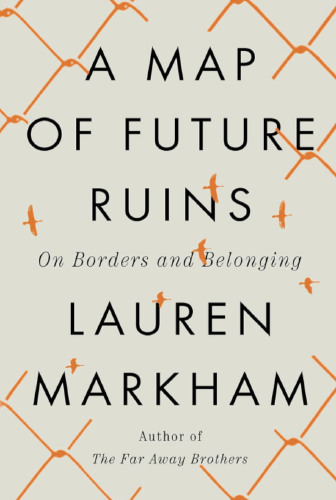
A Map of Future Ruins: On Borders and Belonging
A searching blend of reportage, memoir, and cultural history, exploring the 2020 Moria refugee camp fire in Greece, the mechanics of borders and belonging, and the mythologies that shape migration and identity.
I’m so moved and inspired by this brilliant book.
Part journalism, part memoir - Markham follows the story of Ali and the six migrant boys falsely accused of burning down the Moira refugee camp on the Greek island of Lesbos in 2020, while also examining her own family history and Greek-American lineage, the meaning of human migration, national identity and borders.
What happened to these six boys, Afghan asylum seekers, three who were under the age of 18 — who were wrongfully accused? Four were sentenced in 2021. At the end of the book, they were offered an appeal and retrial court date was pushed back by one year to March of 2024, but this is all I can find of their updated story. I need to know what has happened since to them…
https://www.aljazeera.com/news/2024/3…
I was so moved by the intimate and humane way the author portrayed voices on both sides of the issue, from anti-migrant residents on the island, to the human rights lawyers and activists who work to protect the vulnerable — both in Europe and on the US-Mexican border — simply because it’s the right thing to do, and as the author shared of one human rights defender: “once you acknowledge that this is what you believe to be right, then you must do it. No matter if the desired impact seems feasible or realistic, no matter how difficult.”
Haunted by the stories of dangerous journeys by migrants across the Darien Gap, and the Mexican border. I couldn’t help being moved to tears by so many passages in this book. Written so beautifully, and researched with such care.
Best book I’ve read all year. So relevant to these times. It inspires me to do more meaningful work in this short life.
Main Themes
Lauren Markham’s “A Map of Future Ruins: On Borders and Belonging” is a genre-blending work that weaves together investigative journalism, memoir, and cultural history to interrogate the meaning of borders, migration, and identity in the contemporary world. The book’s narrative is anchored by the 2020 fire at the Moria refugee camp on the Greek island of Lesbos—a disaster that left over 11,000 migrants homeless and led to the controversial arrest and conviction of six young Afghan asylum seekers. Markham, who had visited Moria in 2019 and followed the case from afar during the pandemic, returns to Greece to investigate the aftermath, only to find official stonewalling and a justice system riddled with holes and prejudice.
But the story of Moria is only the starting point for a much broader inquiry. Markham braids her reporting on the fire and its legal aftermath with reflections on her own Greek-American family’s migration story, the mythologies of place and belonging, and the ancient and modern narratives that shape how societies view outsiders. She explores the continuum of migration—from her great-grandmother’s journey through Ellis Island to the perilous crossings of today’s refugees—and interrogates the ways in which stories, both personal and collective, are constructed, mythologized, and weaponized.
The book is notable for its ambitious structure, moving between contemporary Greece, family history, philosophical musings, and even a detour to the Russian-Norwegian border and a meditation on trees. Markham’s prose is vivid and empathetic when describing the lived realities of migrants and the landscapes of Greece, but can become diffuse as she pursues the spiritual and existential dimensions of migration and belonging. The narrative is as much about the search for home and identity as it is about the politics of borders and the failures of European asylum systems.
A central theme is the power of storytelling: who controls the narrative, how mythologies of place and people are created, and how these stories shape both policy and personal experience. Markham is acutely aware of the risks of drawing false equivalencies between her own family’s migration and the harrowing journeys of today’s refugees, but she insists on the emotional and existential commonalities that underlie all migrations. The book is also a meditation on the spiritual crisis of witnessing and writing about suffering, and the limits of what journalism and literature can achieve in the face of systemic injustice.
Critically, “A Map of Future Ruins” has been praised for its ambition, empathy, and the depth of its inquiry into the mechanics of exclusion and belonging. Some reviewers note that its expansive, sometimes meandering structure can dilute its narrative force, but most agree that Markham’s blend of personal and political storytelling offers a powerful lens on one of the defining issues of our time. The book stands as both a call to bear witness and a meditation on the stories we tell about who belongs—and who does not—in a world of ever-shifting borders.